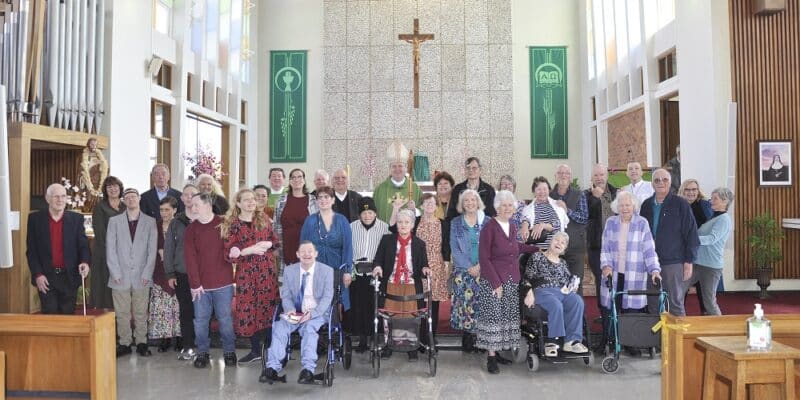By SARAH SPARKS
The power of inclusion, faith, hope, and joy was palpable in the pews recently for people with an intellectual disability.
The 50th jubilee and enduring legacy of G.I.F.T. (Growth In Faith Together) was celebrated in Auckland at the Parish of the Good Shepherd in Balmoral on September 17.
The sacramental programme teaches people with intellectual and learning disabilities.
The church was full of family, friends, caregivers, and members of the Board of the Catholic organisation, which was founded in 1973 by the late Sister Jean Sinclair, MNZM, a Religious of the Cenacle.
Tributes were made over the course of the day about the origins of G.I.F.T. as the Mass was celebrated by Bishop Stephen Lowe with Msgr Bernard Kiely.
“G.I.F.T. has been such a beautiful gift,” Bishop Lowe said.
A photograph of Sister Jean, handprint artwork by the G.I.F.T. parishioners and a lighted candle were some of the “community treasures” carried up the aisle to the sanctuary.
“I’m feeling absolutely delighted today and feel Sister Jean’s presence. Her heart was always for the ones who wanted to meet Jesus, and she made that possible,” said Sister Clare O’Connor from the Cenacle Sisters.
Sister Jean Sinclair had taught children with special needs before joining the Cenacle Sisters.
“If she was here today, she would say keep doing what you’re doing. Gathering and preparing our people to have Communion. Building a community of faith,” Sister Clare said.
Lijana Anketell, an original volunteer and later RE coordinator on Sister Jean’s retirement was reminiscing about the past, while reuniting with her old students like altar server John Overwater, who is a member of the G.I.F.T. community, and parishioners, David and his sister, Helena Mathieson.
“I turned up as a volunteer after hearing Sister Jean talking on the radio with Newstalk ZB talkback host, Geoff Sinclair. She was on every Christmas speaking about G.I.F.T. I was having chemotherapy at a time, but decided to knock on Sister Jean’s door,” Mrs Anketell said.
The resilience and adaptability of the G.I.F.T. programme, especially during Covid-19, was also top of mind for Mrs Anketell.
“We had to shut the houses and the G.I.F.T. Centre ran outdoors. The Religious Education Coordinator, Vivian Aherne, was wonderful. She just used to take it in the park, even when sometimes it rained.”
Father Ezio Blasoni, SM, was another familiar face to many in the congregation, given that he had been a much loved chaplain to the G.I.F.T. people.

Msgr Bernard Kiely with his brother Gerard
The longtime special family connection with G.I.F.T. among the priesthood was also celebrated by Msgr Bernard Kiely and his brother Gerard.
“I knew Sister Jean when I was 16 at Sacred Heart, when we had community service in the sixth and seventh form. I was naturally attracted to the ministry due to having a Downs Syndrome brother,” Msgr Kiely said.
Those were different times, reflecting the thinking of the age when priests weren’t as open as they are now to the possibility of including those with an intellectual disability in the sacramental programme.
“We’d all go up for Communion and Gerard would be sitting there and say what about me?”
Msgr Kiely’s mother approached the priests too, but it was before the time of going up to get a blessing. Sister Jean’s new ministry back then had a profound impact on Gerard and his family.
G.I.F.T., thanks to Sister Jean, paved the way for Gerard to make his first Communion.
“It was such a great occasion for us as a family to celebrate with Father Pat Ward. Mass then became a regular part of Gerard’s life and routine. He has a great sense of the sacred – they all do.”
“Today we saw it, they lack inhibitions but have a very strong sense of the presence of God, creation, and each other.”
“They all speak what it means to be human. I also think that for those of us who have been involved with the intellectually disabled, we often find ourselves being ministered too, especially in the spiritual.”
Gerard’s father, Thomas Kiely, was vhair of G.I.F.T. in the 1990s after Bishop Dennis Browne asked him to be part of it. He was one of the many hundreds of people who have volunteered over the years.
“It was interesting looking at all the historic photos around the walls as many of a participants’ have died, including Sister Jean who had such energy and vision,” Msgr Kiely said.
Her New Zealand Order of Merit, membership of which was awarded in 1996 for her ministry to people with a disability, was proudly on display.
After Mass, there was the cutting of a large chocolate cake and there were many moments of laughter and candour.
Board Chair, Anthony Segedin, thanked those who had walked him through his G.I.F.T. journey and all the lessons he has learnt from G.I.F.T.
He believes that one of the main ones is that people who are not exposed to intellectual disability are uncomfortable with it, because they don’t know how to respond to it.
“If there’s someone who is with Downs, instead of looking away at the pedestrian crossing, show them love and recognition. Why not say hello and smile?”
Mr Segedin has seen the G.I.F.T. students “deep spirituality”. While they may have a disability, they have other gifts and insights that we don’t usually think about, he believes.
“I think I am a better person now. Over seven years I’ve learned a lot and made some wonderful friends.”
As the residential programme of G.I.F.T. is closing by the end of the year, while a religious education programme continues, Mr Segedin feels like the organisation has come full circle.
“We’re going back to the future, 50 years later,” he said with a focus firmly on the next 50 years of religious education for people with a disability.

Reader Interactions